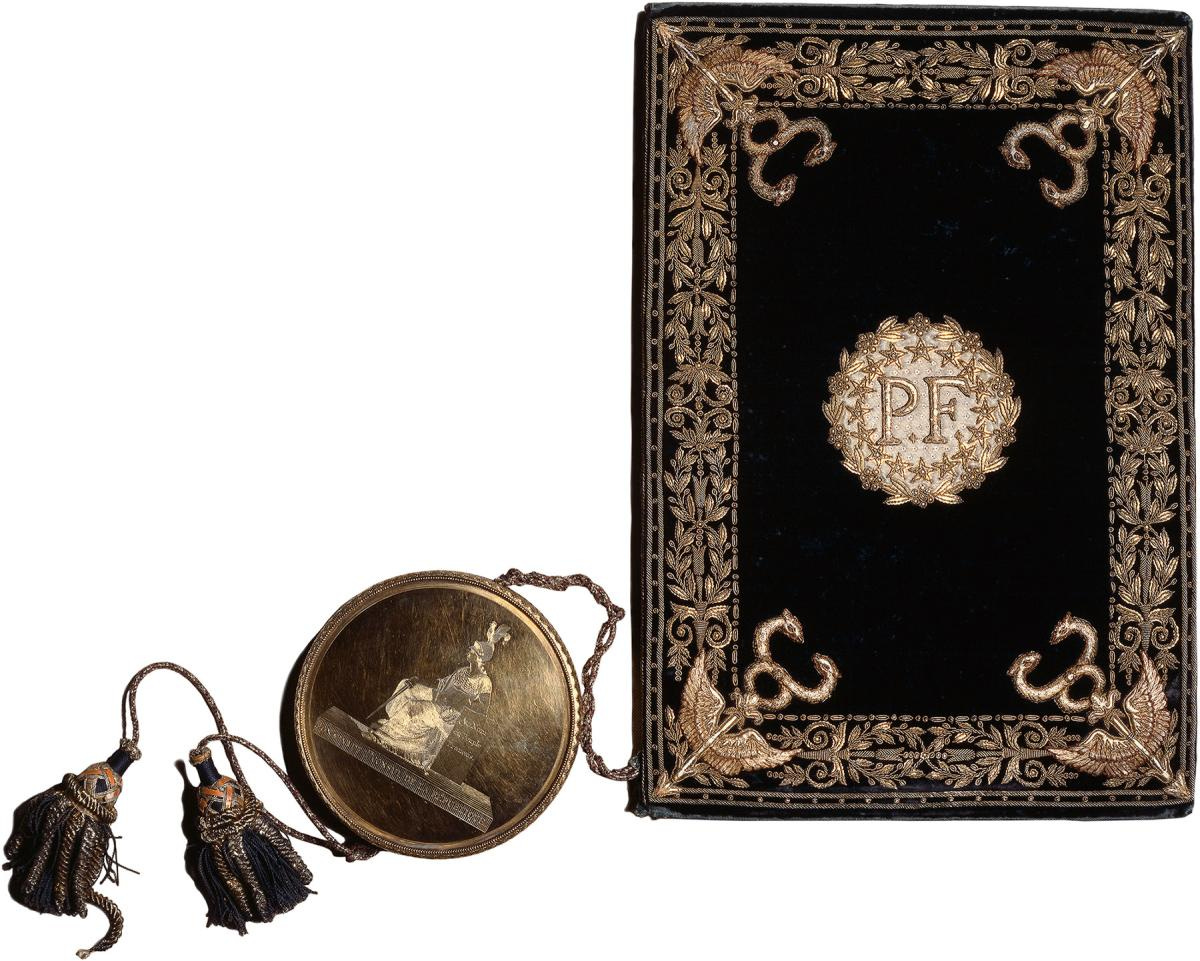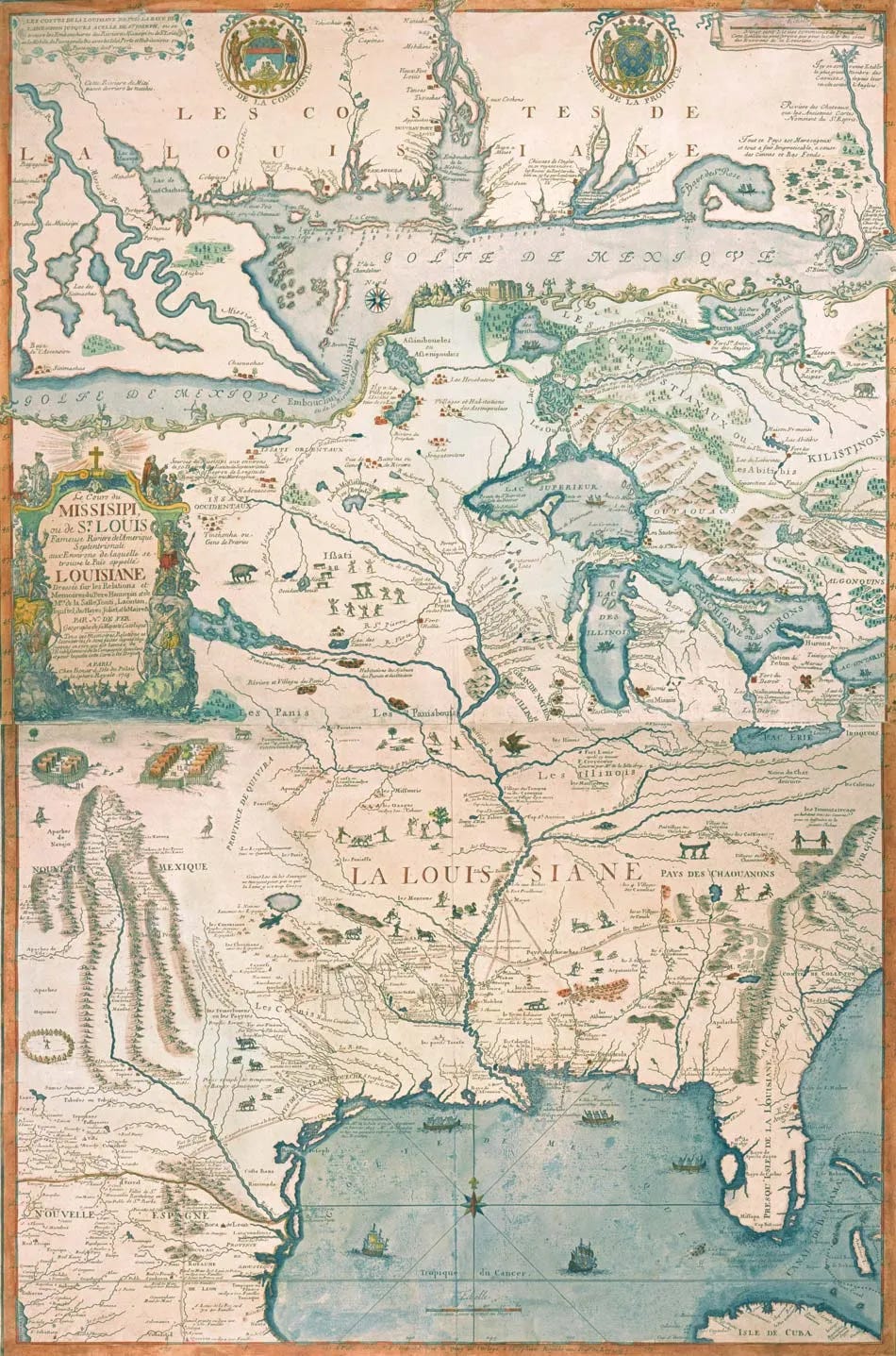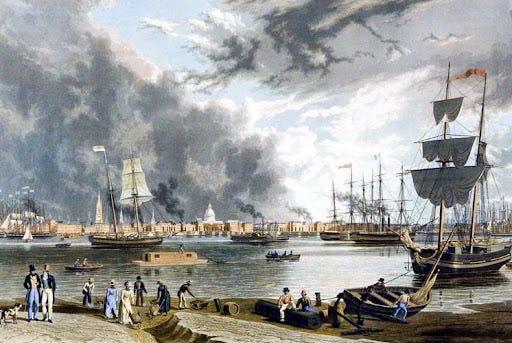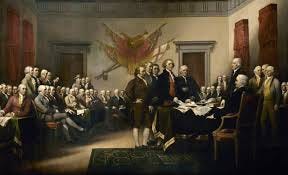Buying Half a Country: The Epic Louisiana Purchase
Imagine stumbling upon an online listing for half a continent at a price lower than a New York City apartment. That’s essentially what occurred in 1803 when the United States, led by President Thomas Jefferson, received the opportunity of a lifetime. This wasn’t merely a land deal; it was the Louisiana Purchase, an acquisition that literally and metaphorically altered the map of America. Encompassing everything from the vibrant port of New Orleans to the steamy hot springs of Arkansas, this deal wasn’t just significant - it was monumental.
Why Did We Buy It Again?
Flashback to the early 1800s: the United States was like a teenager that had just hit a growth spurt, eager to stretch its legs and desperate for more room. But it wasn’t just about space; strategic needs were at play. The Mississippi River and the Port of New Orleans were essential for trade and security. With European powers like Spain and France playing musical chairs with territories, Thomas Jefferson felt the pressing need to ensure American control over these vital assets. Plus, having Napoleon Bonaparte as your potential landlord? Yeah, not ideal. His imperial ambitions could have throttled American trade, so Jefferson grabbed the opportunity when France offered to sell.
The Art of the Deal, 1803 Style
Thomas Jefferson, who was more of a “let’s stick to the rulebook” kind of president, bent his strict constitutional interpretations to make the Louisiana Purchase. Why? Because the deal was too sweet to pass up. For $5 million - or roughly four cents an acre - the United States acquired about 828,000 square miles. This deal included land that would become 15 states, stretching from Louisiana up through Montana. The negotiations, led by American diplomats Robert Livingston and James Monroe in Paris, were a mix of luck and opportunism, with a dash of ‘let’s hope they go for it” as they secured a territory that doubled the size of their nation almost overnight.
What Did We Get Into?
The immediate benefits of the Louisiana Purchase were as vast as the land itself. Economically, it was a bonanza. It secured the crucial Mississippi River and the Port of New Orleans, essential arteries for the agrarian economy of the United States at that time. This wasn’t just about acquiring land; it was about gaining prosperity, security, and space to grow. The strategic acquisition allowed the United States to push further west without European interference, setting the stage for the era of Manifest Destiny that would come to define American expansionism. And administratively? Let’s say Jefferson’s team had their work cut out for them, managing new territories populated with diverse cultures and legal systems.
“We have lived long, but this is the noblest work of our whole lives.” - Robert Livingston
Strategic Stakes: Why the Louisiana Purchase?
Why Here, Why Now?
The early 1800s were a time of geopolitical chess, and the United States was playing with the big kids—France, Spain, and Britain. The Mississippi River was not just a river; it was the economic lifeline for American trade, flowing with goods from the heartland to markets far and wide. When France regained control of the vast Louisiana Territory from Spain in 1800, alarm bells rang all the way to Washington. The thought of Napoleon, a known aggressor with an appetite for expansion, controlling New Orleans was America’s nightmare scenario. Jefferson knew that access to New Orleans was non-negotiable, it was the key to the continent, the doorway to the west.
Diplomacy or Bust
Thomas Jefferson, opting for a velvet glove over a mailed fist, sent James Monroe to Paris to join Robert Livingston. Their mission was straightforward yet daunting: secure New Orleans and ensure American control over the Mississippi. The diplomacy unfolded more like a high-stakes poker game. When France, stretched thin by wars and desperate for cash, offered the entire Louisiana Territory, Monroe and Livingston had to think fast, negotiate hard, and maybe bluff a little. The result? A purchase agreement that would make any real estate mogul green with envy.
Doubling Down: How the Louisiana Purchase Reshaped America
Doubling Down on Territory
The ink was barely dry on the treaty when the size of the United States doubled overnight. The Louisiana Purchase added land that stretched from the Gulf of Mexico to the Canadian border and from the Mississippi River to the Rockies. Imagine the new opportunities: land for farming, resources for mining, and space, lots and lots of space, for the burgeoning American population to spread its wings.
Economic Boomtown
The economic implications of the Louisiana Purchase were profound. It opened the heartland of America to commerce and settlement, driving a wave of westward expansion. New Orleans became a bustling port city, serving as the gateway for goods flowing down the Mississippi. The territory was rich in resources—timber, minerals, and fertile soil—raw materials that would fuel America’s rise to industrial power. This deal not only transformed the American economy but also its landscape, laying the foundation for a nation that would stretch from sea to shining sea.
“The acquisition of Louisiana at this time has placed the United States in a situation as interesting as it is important.” - Thomas Jefferson
Mapping the Future: The Louisiana Purchase Expands the USA
Redefining the Map
With the stroke of a pen, America’s western frontier exploded - beyond the Mississippi, rolling out over plains, mountains, and forests that many Easterners had never imagined. The Louisiana Territory added 15 future states to the Union, creating a tapestry of new lands that would need to be surveyed, governed, and, yes, sold. Hot Springs, Arkansas, nestled within this vast acquisition, soon became a point of interest for its therapeutic waters, adding a spa destination to the rugged frontier.
The Surveyor’s Dream
Post-Louisiana Purchase, the United States government faced the enormous task of mapping its new territories. This effort involved more than merely drawing lines; it was about shaping the future. Surveyors such as Lewis and Clark ventured out to chart rivers, mountains, and valleys, their reports filling in the empty spaces on American maps and in the minds of the people. Each expedition returned with stories of abundant resources and fertile lands, inspiring dreams of a nation that could stretch from coast to coast.
Cultural Mosaic: The Diverse Impact of the Louisiana Purchase
Melting Pot on a Massive Scale
The Louisiana Purchase was not just a transfer of land but of people. The territory was a cultural mosaic of French, Spanish, Native American, and African communities. Each group brought its own traditions, legal systems, and ways of life to the American melting pot. In places like New Orleans, these cultures blended to create a unique, vibrant local identity that thrives even today in its music, food, and festivals.
Frontier of Challenges
Integrating the new territories presented significant challenges. The expansion sparked conflicts with Native American tribes, whose lands and ways of life were jeopardized by American settlers. The federal government faced the delicate task of managing these tensions through treaties, which often favored expansion over fair negotiation. The Louisiana Purchase also raised questions about slavery, as new states formed from the territory would need to declare themselves slave or free, setting the stage for a national crisis.
“This vast acquisition was something more than the fruit of one man’s ambition. It was a new theater of hopes and dreams.” - Contemporary Commentator
Beyond Borders: The Last Legacy of the Louisiana Purchase
Economic Expansion & Political Power
The economic windfall from the Louisiana Purchase was profound. The acquisition not only supplied the United States with invaluable natural resources but also opened up vast tracts of land for agriculture and settlement. This boosted the nation’s economic engine, driving the growth of cities and the expansion of industries. Furthermore, control over the Mississippi River and the port of New Orleans strengthened America’s ability to trade freely and thrive economically, decreasing reliance on European powers for maritime access.
Political Reverberations Across Centuries
Politically, the Louisiana Purchase showcased the United States government’s ability to take significant action and established a precedent for future territorial expansion through peaceful means. It also tested the Constitution in new ways, especially concerning the extent of executive power. The decisions made during this time shaped how America would expand, incorporating new territories and addressing the challenges of a diverse and growing union.
A Monumental Deal: Reflecting on the Louisiana Purchase
In retrospect, the Louisiana Purchase stands out as one of the most pivotal developments in American history. It effectively doubled the size of the nation, setting the United States on a path toward becoming a continental power. Every state added from this territory contributed to the rich mosaic that is America today—from the bustling ports of Louisiana to the peaceful hot springs of Arkansas, each has a story that began, in many ways, with this monumental acquisition.
Beyond the immediate economic and political gains, the Louisiana Purchase influenced the nation's very identity, fostering a spirit of adventure and a belief in the limitless possibilities of the American landscape. It laid the groundwork for the idea of Manifest Destiny, the belief that the United States was destined to expand across the North American continent, which would shape American policy and culture for generations.
Reflecting on its significance, it’s clear that the Louisiana Purchase was not merely a transaction of land and money; it was an investment in the future, a declaration of ambition, and a commitment to the idea of progress and opportunity for all who would come to call America home.
References
Lund JW. Historical impacts of geothermal resources on the people of North America. Geo-Heat Center Bulletin [Internet]. 1995 Oct;16(2):7-14. Available from: https://oregontechsfstatic.azureedge.net/sitefinity-production/docs/default-source/geoheat-center-documents/quarterly-bulletin/vol-16/art2.pdf?sfvrsn=4b3f8d60_4
National Parks Service, U.S. Department of the Interior. History & culture [Internet]. 2021 Sep 30 [cited 2022 Jan 12]. Available from: https://www.nps.gov/hosp/learn/historyculture/index.htm
Hanley R. A place apart: A pictorial history of Hot Springs, Arkansas. Fayetteville: University of Arkansas Press; 2011.
Lee R. The true cost of the Louisiana Purchase. Slate Magazine [Internet]. 2017 Mar 1 [cited 2022 Jan 12]. Available from: https://www.slate.com/articles/news_and_politics/history/2017/03/how_much_did_the_louisiana_purchase_actually_cost.html
Warren R. The role of American diplomacy in the Louisiana Purchase [master's thesis]. Portland: Portland State University; 1976. Available from: https://doi.org/10.15760/etd.2578
The Editors of Encyclopedia Britannica. Louisiana Purchase | definition, date, cost, history, map, states, significance, & facts. Encyclopedia Britannica [Internet]. 2024 Jun 18 [cited 2024 Jul 17]. Available from: https://www.britannica.com/event/Louisiana-Purchase
Encyclopedia of Arkansas. Louisiana Purchase. Encyclopedia of Arkansas [Internet]. 2024 Jul 3 [cited 2024 Jul 17]. Available from: https://encyclopediaofarkansas.net/entries/louisiana-purchase-2383/
Encyclopedia of Arkansas. Louisiana Purchase through early statehood, 1803 through 1860. Encyclopedia of Arkansas [Internet]. 2024 Jun 26 [cited 2024 Jul 17]. Available from: https://encyclopediaofarkansas.net/entries/louisiana-purchase-through-early-statehood-1803-through-1860-398/
National Archives. Louisiana Purchase Treaty (1803) [Internet]. 2022 May 10 [cited 2024 Jul 17]. Available from: https://www.archives.gov/milestone-documents/louisiana-purchase-treaty#no-2
Jefferson and the Louisiana purchase. Monticello [Internet]. [cited 2024 Jul 17]. Available from: https://www.monticello.org/thomas-jefferson/louisiana-lewis-clark/the-louisiana-purchase/
Jefferson T, Johnston RH. The writings of Thomas Jefferson. Washington (DC): Issued under the auspices of the Thomas Jefferson Memorial Association of the United States; 1903.
Harriss JA. How the Louisiana Purchase changed the world. Smithsonian Magazine [Internet]. 2013 Nov 17 [cited 2024 Jul 17]. Available from: https://www.smithsonianmag.com/history/how-the-louisiana-purchase-changed-the-world-79715124/
Geography and Map Division, Library of Congress. Louisiana: European explorations and the Louisiana Purchase. Washington (DC): Library of Congress; 2007.
U.S. Senate. The Senate approves for ratification the Louisiana Purchase Treaty [Internet]. 2023 Aug 7 [cited 2024 Jul 17]. Available from: https://www.senate.gov/about/powers-procedures/treaties/senate-approves-louisiana-purchase-treaty.htm
Arkansas.com. Arkansas and the Louisiana Purchase [Internet]. 2018 Jun 1 [cited 2024 Jul 17]. Available from: https://www.arkansas.com/articles/arkansas-and-louisiana-purchase
Office of the Historian. Milestones in the history of U.S. foreign relations: Louisiana Purchase [Internet]. [cited 2024 Jul 17]. Available from: https://history.state.gov/milestones/1801-1829/louisiana-purchase
Matthewson T. Jefferson and Haiti. The Journal of Southern History. 1995;61(2):209-48. Available from: https://doi.org/10.2307/2211576
Muffat S. Building Napoleon's flotillas: An invasion project fraught with difficulties. Napoleonica® the Journal. 2022;4(4):17-36. Available from: https://www.cairn-int.info/revue-napoleonica-the-journal-2022-4-page-17.htm
National Constitution Center. The Louisiana Purchase: Jefferson’s constitutional gamble [Internet]. 2023 Oct 20 [cited 2024 Jul 17]. Available from: https://constitutioncenter.org/blog/the-louisiana-purchase-jeffersons-constitutional-gamble
National Archives. Purchase of Louisiana [Internet]. 1803 Jul 5 [cited 2024 Jul 17]. Available from: https://founders.archives.gov/documents/Hamilton/01-26-02-0001-0101. [Original source: The Papers of Alexander Hamilton, vol. 26, 1 May 1802 – 23 October 1804, Additional Documents 1774–1799, Addenda and Errata, ed. Harold C. Syrett. New York: Columbia University Press; 1979. p. 129-36.]
Hermann B. The Louisiana Purchase and our title west of the Rocky Mountains: With a review of annexation by the United States. Washington (DC): Government Printing Office; 1898.
United States Department of State. State papers and correspondence bearing upon the purchase of the territory of Louisiana. Washington (DC): Government Printing Office; 1903.
Brown ES. Constitutional history of the Louisiana Purchase. Berkeley: University of California Press; 1920.
Hosmer JK. The history of the Louisiana Purchase. New York: D. Appleton and Company; 1904.
Howard JQ. History of the Louisiana Purchase. Chicago: Callaghan & Company; 1902.








